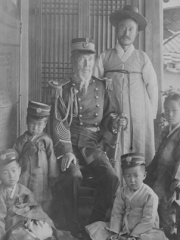
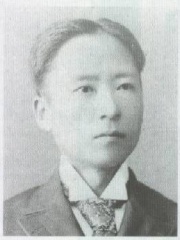
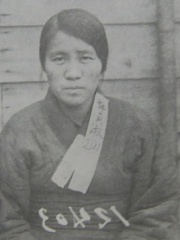

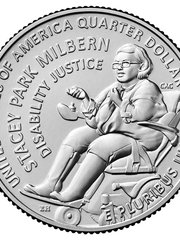
The Most Famous
SOCIAL ACTIVISTS from South Korea
This page contains a list of the greatest South Korean Social Activists. The pantheon dataset contains 840 Social Activists, 6 of which were born in South Korea. This makes South Korea the birth place of the 37th most number of Social Activists behind Peru, and Ireland.
Top 6
The following people are considered by Pantheon to be the most legendary South Korean Social Activists of all time. This list of famous South Korean Social Activists is sorted by HPI (Historical Popularity Index), a metric that aggregates information on a biography's online popularity.

1. Yun Chi-ho (1864 - 1945)
With an HPI of 71.56, Yun Chi-ho is the most famous South Korean Social Activist. His biography has been translated into 78 different languages on wikipedia.
Yun Ch'iho (Korean: 윤치호; 23 January 1865 – 6 December 1945) was a Korean politician. His name is sometimes spelled Yun Tchi-Ho, his art name was Chwaong (좌옹), and his courtesy name was Sŏnghŭm (성흠). Yun was born a member of a prominent aristocratic (yangban) family. He was the son of General Yun Ung-nyeol, who served as a minister in the Joseon government. Yun's connections earned him the rare opportunity to study abroad, and he did so in China, Japan and the United States. In the United States, he attended both Vanderbilt University and Emory University. Yun was a prominent politician during the late Joseon and Korean Empire periods. He was a member of a number of reformist organizations, including the Independence Club, the People's Joint Association, and the New People's Association. He was a strong nationalist especially in his early years. He served in various government positions. He was also an ardent Methodist Christian, and an early leader of the Korean YMCA. Although Yun was widely considered a nationalist for much of his early career, as Japan tightened its grip over Korea and eventually colonized it in 1910, Yun began to support the cause of the Japanese. He notably did not support many of the actions of the Korean independence movement, such as the March First Movement. As such, many recent Koreans remember him as a collaborator ("chinilpa").

2. Soh Jaipil (1864 - 1951)
With an HPI of 67.17, Soh Jaipil is the 2nd most famous South Korean Social Activist. His biography has been translated into 60 different languages.
Seo Jae-pil (Korean: 서재필; Hanja: 徐載弼; January 7, 1864 – January 5, 1951), better known by his English name Philip Jaisohn, was a Korean American politician, physician, and Korean independence activist. He was the first Korean to become a naturalized citizen of the United States. He also founded the Tongnip sinmun, the first Korean newspaper written entirely in Hangul. Jaisohn was one of the organizers of the failed Kapsin Coup in 1884. He was thus convicted for treason and sought refuge in the United States where he became a citizen and earned a medical doctorate. Upon returning to Korea in 1895, Jaisohn was offered a position as a chief advisor of the Joseon government. He declined, choosing to focus on reform movements where he advocated for democracy, Korean independence and self reliance from foreign intervention, numerous civil rights and universal suffrage. Jaisohn was forced to return to the United States in 1898, from where he participated in the First Korean Congress and advocated for the March First Movement and U.S. Government support for Korean independence. Jaisohn became a chief advisor to the United States Army Military Government in Korea after World War II and was elected as an interim representative in South Korea in the 1946 legislative election. He died in 1951 shortly after returning to the United States during the Korean War. His remains were reinterred at the Seoul National Cemetery in 1994. Jaisohn was an admirer of American-style liberalism and republicanism. He was also reform-minded, and sought to revise Confucianist culture and institutions in Korea.

3. Ho Jong-suk (1908 - 1991)
With an HPI of 62.50, Ho Jong-suk is the 3rd most famous South Korean Social Activist. Her biography has been translated into 29 different languages.
Ho Jong-suk (Korean: 허정숙; 16 July 1908 – 5 June 1991) was a prominent female figure in the Communist Party of Korea and in the sexual liberation movement of Korea under Japanese rule. From 1948, she served multiple offices in North Korea, including the Minister of Health and Chief Justice of the Supreme Court of North Korea.

4. Yun Hyon-seok (1984 - 2003)
With an HPI of 59.63, Yun Hyon-seok is the 4th most famous South Korean Social Activist. His biography has been translated into 79 different languages.
Yun Hyon-seok (Korean: 윤현석; Hanja: 尹賢碩; August 7, 1984 – April 26, 2003) was a South Korean LGBT poet, writer, and activist. He wrote under the pen names Yuk Wu-dang (육우당, 六友堂, home of six friends) and Seolheon (설헌; 雪軒), and was also known by his nickname Midong (미동; 美童, beautiful boy) or Donghwa (동화; 童花, Boy flower). Yun spent most of his life being excluded, bullied, and discriminated against for being gay. He used writing as an escape, something he carried with him after he dropped out of high school and moved to Seoul's Dongdaemun District. He became an active member and staff member of Solidarity for LGBT Human Rights of Korea. Yun participated in the LGBT rights movement, as well as movements in support of disability rights and sex worker rights and in opposition of mandatory conscription. A devout Catholic, Yun struggled immensely with the Church's rejection of homosexuality and spent much of his time arguing against misconceptions and cruelty. Yun died by suicide on April 26, 2003.
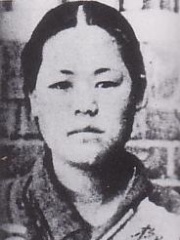
5. Ryu Gwansun (1902 - 1920)
With an HPI of 58.89, Ryu Gwansun is the 5th most famous South Korean Social Activist. Her biography has been translated into 18 different languages.
Yu Gwan-sun (Korean: 유관순; Hanja: 柳寬順; December 16, 1902 – September 28, 1920) was a Korean independence activist. She was particularly notable for her role in South Chungcheong during the March 1st Movement protests against Japanese colonial rule. She has since become one of the most famous Korean independence activists and a symbol for the movement.

6. Stacey Milbern (1987 - 2020)
With an HPI of 24.20, Stacey Milbern is the 6th most famous South Korean Social Activist. Her biography has been translated into 16 different languages.
Stacey Park Milbern (May 19, 1987 – May 19, 2020) was a South Korean and American activist for disability justice, advocating for fair treatment of those with disability in the United States. She served on the North Carolina Commission for the Blind and the Statewide Independent Living Council, as well as the President's Committee for People with Intellectual Disabilities under U.S. president Barack Obama. She also helped establish Disability History and Awareness Month in North Carolina. In March 2020, she engaged in mutual aid to provide food and medical care to homeless and disabled people in the San Francisco Bay Area during the COVID-19 pandemic before dying from surgical complications related to kidney cancer in May of that year.
People
Pantheon has 6 people classified as South Korean social activists born between 1864 and 1987. Of these 6, none of them are still alive today. The most famous deceased South Korean social activists include Yun Chi-ho, Soh Jaipil, and Ho Jong-suk. As of April 2024, 1 new South Korean social activists have been added to Pantheon including Stacey Milbern.
Deceased South Korean Social Activists
Go to all RankingsYun Chi-ho
1864 - 1945
HPI: 71.56
Soh Jaipil
1864 - 1951
HPI: 67.17
Ho Jong-suk
1908 - 1991
HPI: 62.50
Yun Hyon-seok
1984 - 2003
HPI: 59.63
Ryu Gwansun
1902 - 1920
HPI: 58.89
Stacey Milbern
1987 - 2020
HPI: 24.20
Newly Added South Korean Social Activists (2025)
Go to all RankingsOverlapping Lives
Which Social Activists were alive at the same time? This visualization shows the lifespans of the 6 most globally memorable Social Activists since 1700.

